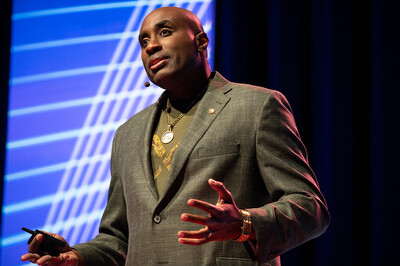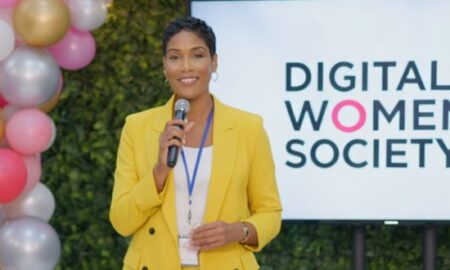
Today we’d like to introduce you to Elisa Carlson.
Thanks for sharing your story with us Elisa. So, let’s start at the beginning and we can move on from there.
I’m from a small town, Griffin, Georgia, but my mom is a wonderful community theatre actress/director and I always loved watching her. I was accepted into the Georgia Governor’s Honors program in Drama/Acting while in high school and that was it — I knew I’d found my path. While in undergrad, I realized I wanted to focus on classic plays, and I started my career studying acting seriously in a terrific and very tough classical theatre graduate training program. In that program, we developed a strong skill set in voice and speech, text and dialects. I was working in New York as an actress when friends began to ask me to help them with their Shakespeare monologues or coach their dialects for auditions, and I discovered I had a real knack for it and enjoyed it. That led to my doing some professional theatre coaching Off-Broadway, and I continued coaching work when I moved back to Atlanta in my mid 30’s. I’d had a major illness and didn’t know if I’d have the strength to pursue acting again, but coaching was something in my field that I could still do. I reached out to Richard Garner, then Producing Artistic Director at Georgia Shakespeare, who gave me a shot coaching a season (which led to many more), and to my dear friend from Governor’s Honor’s, Chris Coleman, then Artistic Director at Actor’s Express (now at the Denver Center) , who also put me to work right away. Coaching and teaching for the Alliance Theatre and Theater Emory soon followed. After my daughter was born, Chris noticed that I seemed to be perfectly healthy and convinced me to be in a show at the Express (Sandra Deer’s lovely Sailing to Byzantium) which went very well, so I began acting again for those theatres as well as teaching and coaching. I worked closely with Kenny Leon when he was the AD at the Alliance, and he brought me out to Oregon Shakespeare with him to coach dialects for a play, and Campbell Scott hired me to coach text and act in his Hallmark film of Hamlet back in New York.
Soon, I had a pretty well-known national reputation as a coach, and the prestigious Guthrie Theater in Minnesota asked me if I’d consider joining their artistic staff to coach shows on their season as well as teach in their BFA actor training program. My family hadn’t been looking to leave Atlanta (we love it here), but I knew the Guthrie was going to challenge me and put me in the room with outstanding talent, and that I would learn a LOT. While at the Guthrie, I coached more than 30 shows and acted in a few there and elsewhere. I also began a directing career working with the Guthrie BFA students, something I’d never had the confidence to do before. At the Guthrie, I had the opportunity to work on Tony Kushner and Ellen McLaughlin premieres, work with world-class actors and directors, observe the Globe Theatre in residence with the wonderful actor Mark Rylance (who taught in my classes) and witness Ian McKellen on tour with King Lear. It was a remarkable time, but after eight years in the snows of Minnesota we were looking to return home when Richard Garner (again, my angel) told me of the Gainesville Theatre Alliance: how much he thought of the training program and the professional quality of the productions, and that they were looking for a professor of voice & speech and a resident director. It was a perfect fit.
I direct and act in shows there (our GTA season features our students alongside professional actors, designers, etc.), and teach voice, speech and directing. Although GTA is located on the University of North Georgia/Oakwood and Brenau University campuses (in or near Gainesville) I live in the Tucker/Norcross area so I can also continue to work professionally in Atlanta. I’ve begun to direct in town (most recently Moxie at Theatrical Outfit) and love when I get to act (The Book of Will at Theatrical Outfit, and the upcoming Woman and Scarecrow at Aris) or record an audiobook. I’m coaching at the Alliance again (going on more than 40 shows there now…) which is an exciting place to be under Susan Booth’s leadership. I also leave town occasionally to coach at other major regionals like American Player’s Theatre (WI) and the Alley (TX). And WOW have the movies come calling! When we moved back from Minnesota I had no idea of the extent of Georgia’s film industry. There is more work coaching film actors than I could ever have imagined. My favorite film experiences have been coaching all the historic voices/dialects for Ava DuVernay’s Selma and for Damien Chazelle’s First Man. Usually, on a film, you are only there to coach one or two people, but on those two movies, I worked with almost every principal and supporting player which meant I was able to contribute more meaningfully to the artistic process. I was also able to observe Ava and Damien at work as I was on the set full-time and came away inspired and awe-struck by their talent and dedication as artists. In other film experiences, I had a great time working with Ansel Elgort and Lily James on Edgar Wright’s Baby Driver, with actors from Africa on The Good Lie, with Tika Sumpter playing Michelle Obama in Southside with You, and Charlie Heaton for “Stanger Things”, among many others. I try to balance the coaching, teaching, acting and directing so that I’m using all my skill sets or talents.
We’re always bombarded by how great it is to pursue your passion, etc. – but we’ve spoken with enough people to know that it’s not always easy. Overall, would you say things have been easy for you?
I would say that beyond managing my illness on the rare occasions it flares up, obstacles I’ve had to overcome have to do with the time period I grew up in. I studied acting in the 1980’s when being over six feet tall in heels meant I had casting limitations that might not occur now. I also studied classical theatre before the era of non-traditional casting. Shakespeare’s plays have few female roles , with only two or three of those being major roles, while roles are plentiful for men. Classical theatre companies hired three to four times more male actors than female, meaning competition for the few slots for women was brutal. Classic plays produced now are more likely to employ cross-gender casting in some roles, leading to more parity for actresses, and Shakespeare festivals include newer plays with more roles for women. I came to directing later in life, and I believe I would have done so much sooner had I known of and been able to work with/observe strong professional female directors. It wasn’t until I was in my 30’s that I was first directed by a woman and coached a play for a woman director, and not until then that I worked on plays written by women. The professional theatre, like the film industry, still has a long way to go for women to experience true equality with men in the workplace, but we are, at least, much more on the way. I must say though, as a white woman I have not experienced nearly the obstacles that women of color my age have faced. I encourage my women students or any young women I work with who ask, to keep at it, to find female mentors, to speak out, and to always listen to the other women in the room.
We’d love to hear more about your work.
What actors and directors do is more talked about, so I’ll focus on coaching. When I work on a play, I help actors to speak authentically and fully, to fill the space they’re working in, to interpret complex texts with clarity and to use the dialect needed for the character with complete confidence and ease. Film work is similar, though the work there tends to focus primarily on the character’s dialect. In film work, I’ve had a specialty in what I call “historic voices”, helping actors to play real people from history (Selma, First Man, Southside with You and others). What directors and actors tell me is more unique about my coaching is that I come at it from an actor’s point of view: when you make these sounds, what changes in how you feel, in what you want? Vowels are emotional sounds, consonants are sounds of action: when you say them in a different dialect it can move something deep in your psyche. Helping an actor to shift into a whole new way of expressing themselves is a delicate and complicated task.
Finding a mentor and building a network are often cited in studies as a major factor impacting one’s success. Do you have any advice or lessons to share regarding finding a mentor or networking in general?
Find a way to get in the room with people who inspire you. Apprentice, intern, assist, and don’t be afraid to ask questions and participate in the process. Get your mind off of you, and into the WORK, and people will want to work with you.
Contact Info:
- Website: www.
elisacarlsondialects.com




Image Credit:
Tom Key in “The Book of Will”, Greg Mooney/Theatrical Outfit
“Men on Boats”, David Carlson/Gainesville Theatre Alliance
Getting in touch: VoyageATL is built on recommendations from the community; it’s how we uncover hidden gems, so if you know someone who deserves recognition please let us know here.




















